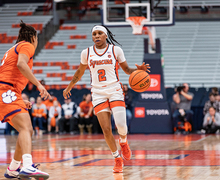Syracuse’s offense can’t keep pace in season ending loss against Cornell
Courtesy of Darl Zehr | Zehr Photography
While Syracuse shut down one of the top scorers in the country in attack Jeff Teat, Cornell's Clarke Petterson lit up SU for five goals.
Syracuse never lost a game in the regular season when leading at halftime.
But when the final buzzer sounded on Sunday night, Nate Solomon lay on the ground with Cornell defender Jake Pulver towering over him and his stick. With 7.1 seconds remaining, Solomon tried to back down Pulver to score the game-tying goal, but he simply couldn’t match the defender’s strength. As time ticked down and the season dwindled, so did Solomon’s chances of scoring. As each second fell, Pulver pushed Solomon further from his goal. And when Solomon finally hit the ground, so did SU’s season, and a sea of red had overtaken Ernie Davis Legends Field.
All season SU’s offense had been a mystery. It could erupt at any moment, but also evaporate. On Sunday night against No. 9-seeded Cornell (13-4), Syracuse (8-7) outscored the second-ranked Big Red offense and thwarted Cornell’s attack to start the game. But an offensive outburst from Cornell seemed inevitable and proved to be, and the challenge would be if the Orange could keep up.
SU did everything it had to do in other areas of the game. Its faceoff crew dominated at the faceoff X, winning 16 of 22 and SU nearly doubled Cornell’s ground ball total, 37-21. Defender Nick Mellen held Cornell’s Jeff Teat, who ended the regular season tied for the leading scorer in the country, to just one assist. The defense and faceoff groups set up the offense to succeed. But when Syracuse needed its offense the most, the group that opened the game on fire suddenly turned to smoke, vanishing into thin air with its tournament hopes.
“If you look at the stats you’d probably think we won the game,” Desko said.
Syracuse’s offensive consistency this season has been non-existent. Whether it be from game-to-game or quarter-to-quarter, the Orange’s offense has struggled to string together solid performances. Against Cornell, it came in between quarters.
Tucker Dordevic opened the game strong, scoring within 49 seconds. The freshman drew Cornell short-stick midfielder, Ryan Bray. After faking right and backtracking, Dordevic sprinted left, stopping, pivoting and firing a shot over his left shoulder. Bray had no chance, as he slid past Dordevic as the freshman pivoted.
As the Orange and Big Red traded blows back and forth, ending the first period at 3-3, a theme developed: Syracuse’s goals didn’t come easily. The Orange scored on far shots and double moves on isolation plays. Cornell earned easy opportunities, with two goals one-on-one with Dom Madonna on the doorstep, and another without a defender to slide from SU. Eventually the ease of those opportunities caught up with the Orange.
After storming out to a 6-3 lead early in the second quarter, Syracuse faded. Within a two-minute period early in the second, SU scored three goals, but in the next 40, the Orange found the back of the net just three times.
“We just weren’t putting them in,” Desko said. “I thought we had our opportunities and we didn’t capitalize on them in the second half.”
Players that had been such steadying forces for Syracuse such as Solomon and Stephen Rehfuss folded, combining for just three points Sunday night, and none in the second half. In other games, unsuspecting players had stepped up in pivotal moments.
Dordevic scored four goals against Virginia, including the game-winner. Brendan Curry scored the final two goals in regulation against North Carolina and assisted on the game-winning goal. And Ryan Simmons scored a season-high two points against Army, including the game-winner in triple overtime. Against Cornell, the only players to score a point came on the first offensive line.
As time continued, Syracuse’s offensive struggles only worsened, while Cornell improved. When the Big Red secured its first lead of the game, SU responded. And when Cornell answered back, SU’s knees buckled out from underneath.
“They made timely plays and timely stops,” Brendan Bomberry said. “That was the difference in the game.”
Syracuse beat itself. In the first matchup between the two teams backup goalie Caelahn Bullen saved 14 shots against SU, nearly half of Syracuse’s 30 shots. This time around, SU outshot the Big Red, with 37 shots, and starting goalie Christian Knight made just eight saves, but Syracuse mustered one more goal than it did in the first matchup.
At one point, Cornell head coach Peter Milliman called a timeout to remove Knight from the game because he wasn’t playing well enough. Knight said no and stayed in, Milliman said. Yet, Syracuse couldn’t find an answer. It couldn’t decode its own enigma, let alone crack Cornell’s. Less than half of SU’s turnovers were caused, yet the Orange coughed up the ball 15 times. This happened just two months ago, when SU turned the ball over 22 times in a road loss to Rutgers, despite winning the faceoff battle, and playing solid defensively for most of the contest.
Syracuse scored a combined 10 goals against Albany and Johns Hopkins in the Carrier Dome, only to unload 15 against Duke in Durham. A top-20 offensive team shouldn’t have been so inconsistent, yet it was. This is one of the youngest teams in SU history, Desko said, and the toughest schedule he’s ever been a part of.
All season he would reiterate, “what doesn’t kill us will make us stronger.”
But with a young team and a gauntlet of a year, players still needed time. In order to cover Teat, the defense had to learn an entirely new scheme in just six days, Mellen said.
But time is on Syracuse’s side. Most of this team will be back next year, and most of it will be back in 2020. But for the upperclassmen, it is quickly running out. Last year marked the first senior class in Syracuse history not to reach the Final Four. This year’s class marks the second.
Following the loss, Bomberry sat at the press conference in between Mellen and Desko, his eyes never lifting above the microphone. He spoke softly when he needed to, with a shakiness in his voice and water in his eyes. When he saw Pulver push Solomon to the ground with seven seconds left, he knew the game was over.
“I’m just wishing for another minute,” Bomberry said. “Nothing you can really do… That’s the end of it.”
Heading into the Colgate game, the senior class explained how competing against the Raiders was their first playoff game of the year — they had to win to make the tournament. To play on another week. To have more time.
Eight days later, it’s all over.
Published on May 13, 2018 at 9:42 pm
Contact Matt: [email protected]




